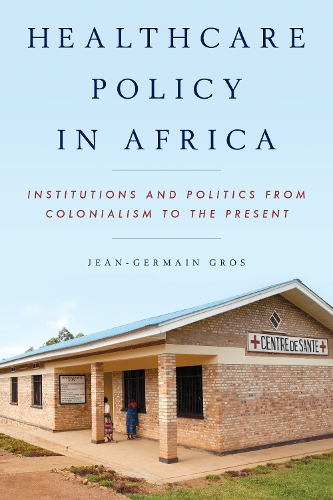
Healthcare Policy in Africa: Institutions and Politics from Colonialism to the Present
(Hardback)
Available Formats
Publishing Details
Healthcare Policy in Africa: Institutions and Politics from Colonialism to the Present
By (Author) Jean-Germain Gros
Bloomsbury Publishing PLC
Rowman & Littlefield Publishers
16th October 2015
United States
Classifications
Tertiary Education
Non Fiction
History of medicine
African history
362.1096
Physical Properties
Hardback
302
Width 159mm, Height 239mm, Spine 26mm
581g
Description
A comparative study of healthcare policy in Africa, the book explores the impact of historical institutions, multilateral organizations, and informal norms, such as, respectively, colonialism, the World Health Organization, and the Western-inspired biomedical approach to disease on health policy choices, implementation, and results in Africa. In addition, it examines the role of international philanthropy, such as the Bill and Melinda Gates Foundation, Partners In Health, Doctors Without Borders, and the multitude of NGOs that pullulate the African healthcare landscape. The emphasis on these (f)actors, not to mention Cuban medical aid, clearly underscores the globalization of healthcare policy in Africa. The case studies of Botswana, Ghana, and Rwanda three differently endowed countries economically that are also at varying stages of democratic rule help to shed light on the influence of domestic political institutions and elite agency on healthcare policy processes across the continent.
Reviews
Africa has been a nearly non-existent continent in the literature on and research into public policy. This means Jean-Germain Gros book is an important exploration of the circumstances and history of the continent, and it does this without repeating the failure clich or the conflict clich so widespread in global lay opinions of Africa. * Medicine, Conflict and Survival *
Healthcare Policy in Africa: Institutions and Politics from Colonialism to the Present...is timely and worth reading. It provides critical and analytical insight into the state of Africas healthcare and, in particular, sheds light on the actors and institutional factors involved in making the broad decisions aimed at addressing the healthcare needs of the African people. Moreover, it looks into the issues that impact or impede the successful achievement of intended healthcare goals in Africa and makes some policy suggestions for better outcomes. . . .[The book is] both ambitious in scope and purpose. . . .[T]he book is reader-focused, informative and should prove valuable not only to African healthcare policy makers or healthcare providers but to a broad spectrum of scholars, students or general readers interested in African affairs. * Journal of Retracing Africa *
[The book] succeed[s] in shedding new light on Africas problems and challenges, while proposing exciting and innovative solutions to such issues. . . .[This book is] a must-read for Africas theorists, practitioners, and policy makers as well as university students who seek to comprehend and interpret contemporary African. * Journal of Global South Studies *
Jean-Germain Gros has produced a compelling analysis of healthcare and related policies in contemporary Africa, and he has done so with a comprehensive treatment of the historical context of colonial practices in regard to health. He anchors the careful analysis of health, including the discussion of three important cases (Botswana, Ghana, and Rwanda), in a strong theoretical basis: historical institutionalism. This is a welcome addition to the literature on health policy in Africa. -- Minion K. C. Morrison, professor and head of department of Political Science and Public Administrations, Mississippi State University
Healthcare Policy in Africaoffers unique insights into the determinants of the essential features of health services in Africa over the last century. Instead of being enmeshed in the technocratic details of policy, the book explores both agency and structure in the making of overall policy, with particular emphasis on governmentality institutions as understood by Foucault. The result is a much-improved understanding of how health policy on the continent is shaped by technical capacities, national politics, institutional inheritance and the web of global institutions and organizations in which they are embedded. Among the books many insights, the chapter in which Gros disaggregates the category of non-governmental organization into four sub-types and analyzes the consequent implications is particularly helpful. -- David K. Leonard, professor emeritus of Political Science and former dean of International and Area studies, University of California, Berkeley
Gros provides a ground-breaking historiography of health care policy in the African continent. His methodological approach employs tapping into historical policy, analyzing the structure of bureaucracy and providing insightful narratives. This book makes a significant contribution to the literature on African social policies. -- Richard T. Middleton IV, associate professor of Political Science, University of Missouri-St. Louis
Author Bio
Jean-Germain Gros is professor of political science and public policy administration at the University of Missouri-St. Louis.
